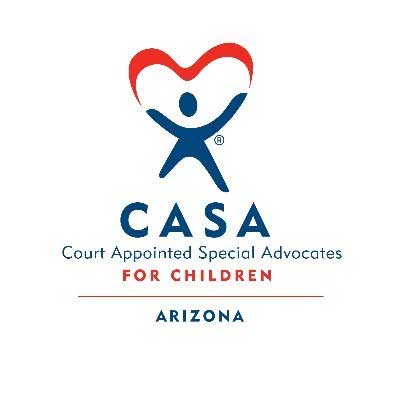PHOENIX – May is National Foster Care Awareness Month, and it is a time for CASA of Arizona to continue to bring awareness to the critical role CASA volunteers provide for children and youth in Arizona’s foster care system.
In 1977, a Seattle judge created a volunteer position called the Court Appointed Special Advocate (CASA) in which a volunteer advocates on behalf of a child’s best interest while they navigate the foster care system. In 1987, the Arizona Supreme Court formally established the CASA program under its jurisdiction. These volunteers are thoroughly vetted, highly trained, and passionate about making a difference.
When children can no longer safely stay in their homes, they are removed and placed into the foster care system. A child may have experienced a variety of different forms of trauma before foster care which can lead to uncertainty. A child with a CASA volunteer fares much better and is half as likely to re-enter the foster care system.
“Being a CASA volunteer gives me an opportunity to give them a second chance — and I’ve also been able to make some meaningful relationships with others that are making a difference along the way,” said a long-time CASA volunteer.
CASA volunteers advocate for the best interests of children and youth in foster care and act as an unchanging and reliable adult during times of transition, advocating for them within the court, child welfare, and school systems while forming relationships with them that can last for years.
A CASA volunteer will get to know the child and every aspect involved in the dependency case, and then provide the judge with the information they need to act in the best interest of the child. That information aids the judge in determining the best course of action for the child, while reunification remains the goal.
June is National Reunification Month
Throughout Arizona, June is a time to recognize the efforts that help families stay together and overcome obstacles to provide a safe home and reunify after their child was placed in out-of-home care.
According to the Children’s Bureau with the Administration for Children and Families (ACF) of the U.S. Department of Health and Human Services (HHS), most children exiting foster care are reunited with their families.
Children can experience trauma when separated from their families. Maintaining relationships with relatives can increase stability and help children maintain a sense of identity. It is in the child’s best interest to be reunified with their family when safely possible. Reunified families are an inspiration because they have overcome adversities and are now equipped with tools to maintain a positive future.
CASA of Arizona volunteers are trained to work with experts to identify and recommend services aimed at keeping families together while looking out for the child’s best interest.
Each of Arizona’s 15 county CASA programs is seeking volunteers to meet the needs of children who do not have a CASA. Furthermore, CASA is working on expanding the diversity and demographics of its volunteer base to better reflect and serve the children in care.
CASA volunteers do not need any prior special training and come from all walks of life. Anyone 21 years of age or older, who can pass a thorough background check and complete 30 hours of training, is encouraged to apply. Another way to get involved is a program with similar requirements called the Foster Care Review Board (FCRB). A judge appoints volunteers to a 5-member panel that meets online one weekday per month to review the cases of children in foster care.
To learn more about becoming a CASA volunteer visit, AZCASAVolunteer.org. To learn more about becoming a FCRB volunteer or to watch a video about volunteering, visit, AZFCRB.org
CASA of Arizona and the Foster Care Review Board operate in all 15 counties in Arizona and are open year-round to recruit and train volunteers to help the children in Arizona’s foster care system. The programs are administered by the Arizona Supreme Court. Follow CASA of Arizona on Facebook @CASAofArizona or Instagram @CASA_of_Arizona.









.jpg)